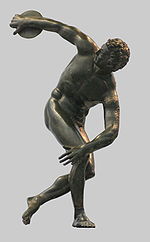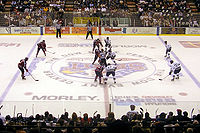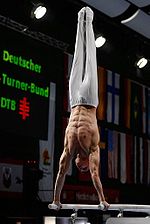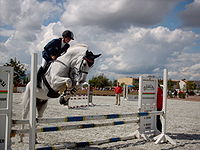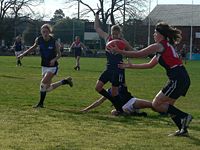- Sport
-
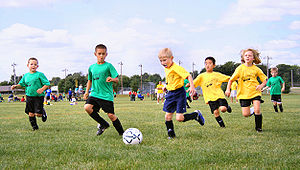 Sport in childhood. Association football, shown above, is a team sport which also provides opportunities to nurture social interaction skills.
Sport in childhood. Association football, shown above, is a team sport which also provides opportunities to nurture social interaction skills.
Sport is all forms of physical activity which, through casual or organised participation, aim to use, maintain or improve physical fitness and provide entertainment to participants. Sport may be competitive, where a winner or winners can be identified by objective means, and may require a degree of skill, especially at higher levels. Hundreds of sports exist, including those for a single participant, through to those with hundreds of simultaneous participants, either in teams or competing as individuals. Some non-physical activities, such as board games and card games are sometimes referred to as sports, but a sport is generally recognised as being based in physical athleticism.
Sports are usually governed by a set of rules or customs. Physical events such as scoring goals or crossing a line first often define the result of a sport. However, the degree of skill and performance in some sports such as diving, dressage and figure skating is judged according to well-defined criteria. This is in contrast with other judged activities such as beauty pageants and body building, where skill does not have to be shown and the criteria are not as well defined.
Records are kept and updated for most sports at the highest levels, while failures and accomplishments are widely announced in sport news. Sports are most often played just for fun or for the simple fact that people need exercise to stay in good physical condition. However, professional sport is a major source of entertainment.
While practices may vary, participants in many sports are expected to display good sportsmanship, and observe standards of conduct such as being respectful of opponents and officials, and congratulating the winner after having lost.[citation needed]
Contents
Etymology and meaning
"Sport" comes from the Old French desport meaning "leisure". American English uses the term "sports" to refer to this general type of recreational activity, whereas other regional dialects use the singular "sport". The French word for sport is based on the Persian word bord, meaning "winning" or "win". The Chinese term for sport, tiyu (体育; 體育) connotes physical training. The modern Greek term for sport is Αθλητισμός (athlitismos), directly cognate with the English terms "athlete" and "athleticism".
The oldest definition of sport in English (1300) is of anything humans find amusing or entertaining.[1] Other meanings include gambling and events staged for the purpose of gambling; hunting; and games and diversions, including ones that require exercise.[2] Roget's defines the noun sport as an "activity engaged in for relaxation and amusement" with synonyms including diversion and recreation.[3]History
There are artifacts and structures that suggest that the Chinese engaged in sporting activities as early as 2000 BC.[4] Gymnastics appears to have been a popular sport in China's ancient past. Monuments to the Pharaohs indicate that a number of sports, including swimming and fishing, were well-developed and regulated several thousands of years ago in ancient Egypt.[5] Other Egyptian sports included javelin throwing, high jump, and wrestling. Ancient Persian sports such as the traditional Iranian martial art of Zourkhaneh had a close connection to the warfare skills.[6] Among other sports that originate in ancient Persia are polo and jousting.
A wide range of sports were already established by the time of Ancient Greece and the military culture and the development of sports in Greece influenced one another considerably. Sports became such a prominent part of their culture that the Greeks created the Olympic Games, which in ancient times were held every four years in a small village in the Peloponnesus called Olympia.[7]
Sports have been increasingly organized and regulated from the time of the ancient Olympics up to the present century. Industrialization has brought increased leisure time to the citizens of developed and developing countries, leading to more time for citizens to attend and follow spectator sports, greater participation in athletic activities, and increased accessibility. These trends continued with the advent of mass media and global communication. Professionalism became prevalent, further adding to the increase in sport's popularity, as sports fans began following the exploits of professional athletes through radio, television, and the internet—all while enjoying the exercise and competition associated with amateur participation in sports.
In the New Millennium, new sports have been going further from the physical aspect to the mental or psychological aspect of competing. Electronic sports organizations are becoming more and more popular.
Sportsmanship
Sportsmanship is an attitude that strives for fair play, courtesy toward teammates and opponents, ethical behaviour and integrity, and grace in victory or defeat.[8][9][10]
Sportsmanship expresses an aspiration or ethos that the activity will be enjoyed for its own sake. The well-known sentiment by sports journalist Grantland Rice, that it's “not that you won or lost but how you played the game", and the modern Olympic creed expressed by its founder Pierre de Coubertin: "The most important thing... is not winning but taking part" are typical expressions of this sentiment.
Violence in sports involves crossing the line between fair competition and intentional aggressive violence. Athletes, coaches, fans, and parents sometimes unleash violent behaviour on people or property, in misguided shows of loyalty, dominance, anger, or celebration. Rioting or hooliganism are common and ongoing problems at national and international sporting colove with.
Professional sports
Main article: Professional sportThe aspect of sports, together with the increase of mass media and leisure time, has led to "professionalism" in sports. This has resulted in some conflict, where the paycheck are more important than recreational aspects, or where the sports are changed simply to make them more profitable and popular, thereby losing certain valued traditions. Indeed, since sport by definition is a leisure activity, "professional sport" does not and cannot exist. However the term is commonplace and accepted to mean a game or other activity, regarded by the general population as sport, which is performed by persons for reward with the intent to entertain spectators. The entertainment aspect also means that sportsmen and women are often elevated to celebrity status in media and popular culture. For this reason, many journalists have suggested that sports should not be reported by the general media but only by specialist magazines.
Politics
Main article: Politics and sportsSports and politics can influence each other greatly.
When apartheid was the official policy in South Africa, many sports people, particularly in rugby union, adopted the conscientious approach that they should not appear in competitive sports there. Some feel this was an effective contribution to the eventual demolition of the policy of apartheid, others feel that it may have prolonged and reinforced its worst effects.[11]
The 1936 Summer Olympics held in Berlin was an illustration, perhaps best recognised in retrospect, where an ideology was developing which used the event to strengthen its spread through propaganda.
In the history of Ireland, Gaelic sports were connected with cultural nationalism. Until the mid 20th century a person could have been banned from playing Gaelic football, hurling, or other sports administered by the Gaelic Athletic Association (GAA) if she/he played or supported football, or other games seen to be of British origin. Until recently the GAA continued to ban the playing of football and rugby union at Gaelic venues. This ban is still enforced, but was modified to allow football and rugby to be played in Croke Park while Lansdowne Road was redeveloped into Aviva Stadium. Until recently, under Rule 21, the GAA also banned members of the British security forces and members of the RUC from playing Gaelic games, but the advent of the Good Friday Agreement in 1998 led to the eventual removal of the ban.
Nationalism is often evident in the pursuit of sports, or in its reporting: people compete in national teams, or commentators and audiences can adopt a partisan view. On occasion, such tensions can lead to violent confrontation among players or spectators within and beyond the sporting venue, as in the Football War. These trends are seen by many as contrary to the fundamental ethos of sports being carried on for its own sake and for the enjoyment of its participants.
A very famous case when sports and politics colided was the 1972 Olympics in Munich. Masked men entered the hotel of the Israeli olympic team and killed many of their men. This was known as the Munich massacre.
Physical art
Sports have many affinities with art. For example, figure skating, drum corps, skateboarding, artistic gymnastics, dancesport, and T'ai chi can be considered artistic spectacles. Similarly, there are other activities that have elements of sport and art in their execution, such as bodybuilding, free running, martial arts, professional wrestling, performance art, yoga, dressage, and culinary arts. Perhaps the best example is bull-fighting, which in Spain is reported in the arts pages of newspapers.
All sports involve physical and mental activities that are pursued for more than simply utilitarian reasons. For instance, running, when done as a sport, occurs for reasons beyond simply moving from one place to another. Value is gained from this activity when it is conducted simply for its own sake. This is similar to the concept of aesthetic value, which is seeing something over and above the strictly functional value coming from an object's normal use. For instance, an aesthetically pleasing car is one which doesn't just get from A to B, but which impresses with its grace, poise, and charisma. In the same way, a sporting performance such as jumping doesn't just impress as being an effective way to avoid obstacles. It impresses because of the ability, skill, and style that is demonstrated in its performance.
Art and sports were clearly linked at the time of Ancient Greece, when gymnastics and calisthenics invoked admiration and aesthetic appreciation for the physical build, prowess and arete displayed by participants. The modern term art as skill, is related to this ancient Greek term arete. The closeness of art and sport in these times was revealed by the nature of the Olympic Games, which were celebrations of both sporting and artistic achievements, poetry, sculpture and architectures.
Technology
Technology has an important role in sports, whether applied to an athlete's health, the athlete's technique, or equipment's characteristics.
As sports have grown more competitive, the need for better and fancier equipment has arisen. Such as Golf clubs, bicycles, American footballs and helmets, tennis rackets, baseball and cricket bats, hockey skates.
Ranging from nutrition to the treatment of injuries, as the knowledge of the human body has deepened over time, an athlete's potential has been increased. Athletes are now able to play to an older age, recover more quickly from injuries, and train more effectively than previous generations of athletes.
Advancing technology created new opportunities for research into sports. It is now possible to analyze aspects of sports that were previously out of the reach of comprehension. Being able to use motion capture to capture an athlete's movement, or advanced computer simulations to model physical scenarios has greatly increased an athlete's ability to understand what they are doing and how they can improve themselves.
Terminology
In British English, sporting activities are commonly denoted by the mass noun "sport". In American English, "sports" is more used. In all English dialects, "sports" is the term used for more than one specific sport. For example, "football and swimming are my favourite sports", would sound natural to all English speakers, whereas "I enjoy sport" would sound less natural than "I enjoy sports" to North Americans.
The term "sport" is sometimes extended to encompass all competitive activities, regardless of the level of physical activity. Both games of skill and motor sport exhibit many of the characteristics of physical sports, such as skill, sportsmanship, and at the highest levels, even professional sponsorship associated with physical sports. Air sports, billiards, bridge, chess, motorcycle racing, and powerboating are all recognized as sports by the International Olympic Committee with their world governing bodies represented in the Association of the IOC Recognised International Sports Federations.[12]
Highly recognized definition of "sport" on EU level is established by the Council of Europe: "all forms of physical activity which, through casual or organised participation, aim at expressing or improving physical fitness and mental well-being, forming social relationships or obtaining results in competition at all levels.[13]
Grassroots sport
Grassroots sport is a popular phrase which is used in most of the articles about sport and sport for all.[14] Czech Sports Association defines Grassroots sport as synergy of population active in "sport", sport organisations on the most basic level, essential infrastructure and suitable environment, where the main driving force is joy of "sport" itself. ("Sport" defined by Council of Europe)[13]
Spectator sport
As well as being a form of recreation for the participants, much sport is played in front of an audience. Most professional sport is played in a theatre of some kind; be it a stadium, arena, golf course, race track, or the open road, with provision for the (often paying) public.
Large television or radio audiences are also commonly attracted, with rival broadcasters bidding large amounts of money for the rights to show certain fixtures. The football World Cup attracts a global television audience of hundreds of millions; the 2006 final alone attracted an estimated worldwide audience of well over 700 million. The Cricket World Cup is another sporting event which attracts a global audience. The 2007 Cricket World Cup attracted about 2.3 Billion viewers all over the world. In the United States, the championship game of the NFL, the Super Bowl, has become one of the most watched television broadcasts of the year. Super Bowl Sunday is a de facto national holiday in America; the viewership being so great that in 2007 advertising space was reported as being sold at $2.6m for a 30 second slot.
The benefits of playing youth sports may include:
- Better grades
- Less risk of drug or alcohol use
- Chance at sports scholarships
- Health Benefits
The biggest risk for youth sports is the increased risk of death or serious injury, including concussions and gym class injuries.[15]
Gender and sports opportunities
The rise of organized sports opportunities for girls has increased dramatically since the passage of Title IX in 1972. The number of female participants continues to rise as variables such as opportunity for involvement, valuing of sports as part of total development and overall fitness for girls and women has increased.
Despite the tremendous gains in sports participation made by girls and women during the last 30 years, there is still a persistent gap in the enrollment figures between males and females. The participation of girls is currently only 39% of the total participation in interscholastic athletics. There has been a slow but steady climb toward gender balance in the percent of female participants, from 32% of the males’ participation in 1973–74 to 63% in 1994–95. Hessel (2000)[Full citation needed].
See also
- Outline of sports
- List of sportspeople
- List of sports attendance figures
- List of professional sports leagues
- Related topics
- Athletic sports
- Combat sport
- Disabled sports
- Electronic sports
- Fandom
- Mind sport
- Most popular sport by country
- Multi-sport events
- National sport
- Nationalism and sports
- Olympic Games
- Paralympic Games
- Spectator sports
- Sponsorship
- Sport in film
- Sport governing bodies
- Sports broadcasting
- Sports club
- Sports coaching
- Sports equipment
- Sports injuries
- Sports league attendances
- Sports marketing
- Sport Psychology
- Sports terms named after people
- Women's sports
References
- ^ Harper, Douglas. "sport (n.)". Online Etymological Dictionary. http://www.etymonline.com/index.php?search=sport&searchmode=none. Retrieved 20 April 2008.
- ^ Webster's Third New International Dictionary of the English Language, Unabridged. Springfield, MA: G&C Merriam Company. 1967. p. 2206.
- ^ Roget's II: The New Thesaurus, Third Edition. Houghton Mifflin Harcourt. 1995. ISBN 0618254145. http://thesaurus.reference.com/browse/sport.
- ^ "Sports History in China". http://chineseculture.about.com/library/weekly/aa032301a.htm.
- ^ "Mr Ahmed D. Touny (EGY), IOC Member". http://www.ioa.leeds.ac.uk/1980s/84085.htm.
- ^ "Persian warriors". http://www.kuwait-info.com/newsnew/NewsDetails1.asp?id=78319&dt=10/13/2006&ntype=World.
- ^ "Ancient Olympic Games". http://www.olympic.org/uk/games/ancient/index_uk.asp.
- ^ "Merriam-Webster". http://www.merriam.com/cgi-bin/dictionary?va=sportsmanship.
- ^ Fish, Joel & Magee, Susan (2003), 101 Ways to Be a Terrific Sports Parent, Fireside, p. 168
- ^ Lacey, David (10 November 2007), "It takes a bad loser to become a good winner", The Guardian
- ^ "Sport and apartheid". http://www.blackwell-synergy.com/doi/abs/10.1111/j.1478-0542.2005.00165.x.
- ^ "Recognized non-Olympic Sports". 2007-01-03. http://www.olympic.org/uk/sports/recognized/index_uk.asp.
- ^ a b Council of Europe. "The Europien sport charter". https://wcd.coe.int/wcd/ViewDoc.jsp?id=206451. Retrieved 16 May 2001.
- ^ European Commission. "The White Paper on Sport". http://ec.europa.eu/sport/white-paper/index_en.htm. Retrieved 11.7.2007.
- ^ "Gym class injuries up 150% between 1997 and 2007", Time, 4 August 2009
- European Commission (2007), The White Paper on Sport.
- Council of Europe (2001), The Europien sport charter.
Further reading
- The Meaning of Sports by Michael Mandel (PublicAffairs, ISBN 1-58648-252-1).
- Journal of the Philosophy of Sport
Sport History · Clubs · Equipment · Law · Medicine · Regulation · Science · Sociology
Outline of sportsCategory · Portal
Categories:- Sports
Wikimedia Foundation. 2010.

